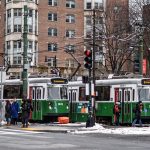Homeless and disabled Bostonians may soon see more opportunities to obtain subsidized housing in the city.
The U.S. Department of Housing and Urban Development awarded Boston Housing Authority $1.8 million Saturday to fund 139 housing vouchers for homeless and disabled Boston residents, bringing the BHA’s supply of vouchers up to 13,500.
Eligible homeless households referred to BHA will receive the new housing vouchers through Massachusetts’s Leading the Way Home program as well as Boston’s Coordinated Access System, according to a city press release.
The funding comes as part of the Mainstream Housing Choice Voucher Program, which makes use of partnerships between BHA and other local agencies to offer disabled individuals affordable housing and supportive services.
Mayor Marty Walsh said in a press release the vouchers will assure all Bostonians they can always find a home in the city.
“These vouchers will provide a much needed housing lifeline for some of our city’s most vulnerable families and individuals with disabilities,” Walsh said, “while offering services that can help to foster a better quality of life.”
According to HUD, housing choice vouchers are limited to U.S. citizens and persons of eligible immigration status. Further eligibility is determined by public housing agencies based on a household’s total annual gross income and family size.
Lydia Agro, director of communications and public affairs at BHA, said the organization owns and operates 13,000 units of public housing and currently administers a total of 13,000 to 14,000 Section 8 housing vouchers to homeless individuals and families.
“Most of them are tenant-based vouchers where people get a subsidy,” Agro said, “and they can go rent from a landlord who rents out privately owned apartments.”
Agro said BHA works closely with the City of Boston in its efforts to end homelessness and that BHA’s housing subsidies prioritize people who are homeless or at risk of becoming homeless.
“These particular vouchers are set aside for households that have at least one adult member who has a disability,” Agro said. “Some of those families could have veteran members as well.”
Agro said affordable housing is a major issue because shelter is a necessity integral to all spheres of people’s lives.
“Housing is a fundamental need and a framework in which the rest of a family’s ability to thrive is based,” Agro said. “Without housing, it’s hard for people to get an education, to look for jobs, to be healthy.”
Lindsey Decker, 35, of West Roxbury, said although she thinks the homeless crisis is not as severe in Boston as it is in other cities around the U.S., it is still a big concern to Massachusetts.
“I think that Boston does have a pretty big problem with homelessness, in part because of the lack of affordable housing that we have in the city,” Decker said. “It’s not as bad as somewhere like San Francisco because the winters are quite punishing here.”
Decker said she thinks it is important to dedicate federal funds toward eradicating homelessness among veterans and other Bostonians.
“If we can make things better for other people, as one of the richest countries in the world, why don’t we do it?” Decker said. “It leads to a better social environment in general.”
Eduardo Molina, 30, of Beacon Hill, said he has personally noticed a spike in the homeless population in Boston since moving back to the city.
“I lived in Boston for years and I went back to Mexico for a couple years and I’m here again,” Molina said. “And I think there’s more [people] in that situation.”
Charles Qian, 22, of Allston, said Bostonians should be concerned about eradicating homelessness in the city.
“I think it’s not a huge problem, but there’s definitely a problem,” Qian said. “There’s something that we can do to help them, especially as a community.”




